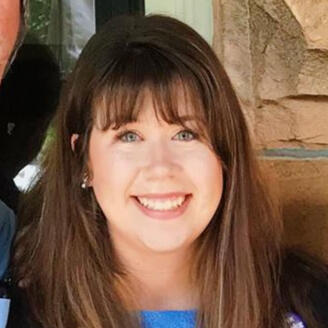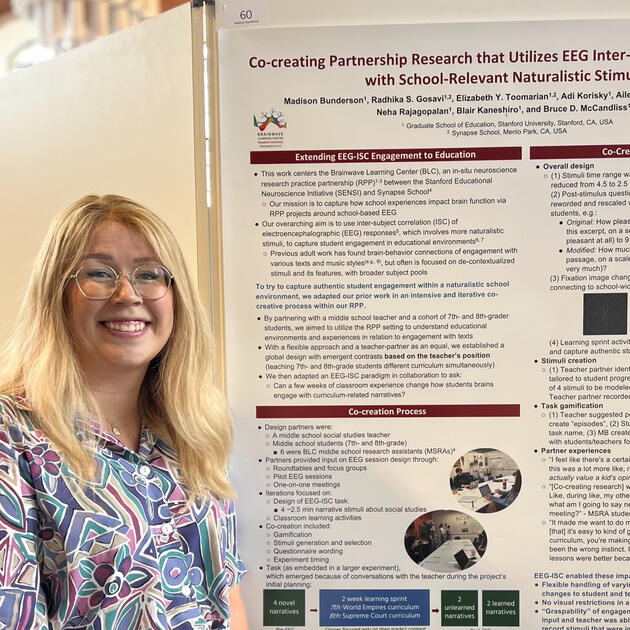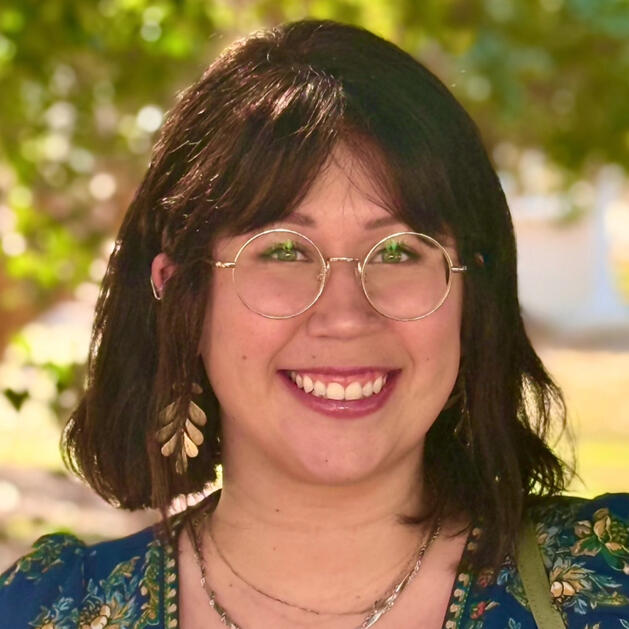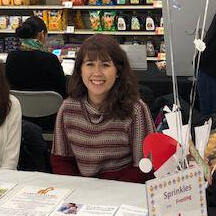
MADISON BUNDERSON
Ph.D. Student in Developmental and Psychological Sciences
Leadership in System-Wide Inclusive Education Fellow
Stanford Graduate School of Education
I'm a doctoral student and researcher with a demonstrated history in using collaborative research approaches in cognitive psychology and neuroscience lens to examine topics spanning from child development to literature studies to education. I currently work primarily with the Stanford Educational Neuroscience Initiative at the Stanford Graduate School of Education, where I focus on investigating the connections and interactions between educational practice and narrative engagement. My aim is to further understand how readers of all ability levels interact with narratives and to deeply involve practicitioners and students in the research process. I'm currently a Lieberman Fellow at Stanford, recognized for extensive leadership and community service in the community. I'm a former Leadership in System-wide Inclusive Education fellow, and still use disability studies and inclusive practices to inform my research and teaching. When not in the lab or the classroom, I'm an avid crafter, gamer, and reader with a particular love of fantasy novels and YA!Prior to pursuing my Ph.D., I was a postgraduate researcher at the Yale Child Study Center. I received my bachelor's degree from The University of the South, often fondly referred to as Sewanee.

Research
"[T]he power of research as an engine of advancement rests in its rigorous technical foundations and its moral mindfulness about the cultural historical conditions that permeate societal problems." - Dr. Alfredo Artiles
Broadly, my research is concerned with reading, narratives, and how special they are to the human mind. There are lots of directions to take this, but my dissertation focuses on understanding how readers engage with different types of narratives (fiction and non-fiction alike). As a psychologist and neuroscientist by training, my primary tool of choice is electroencephalography (EEG). My goal in my work is to better conceptualize the way that reading engagement interacts with the individualized learner profiles of students across the board. My current projects focus on utilizing inter-subject correlation to investigate engagement with different types of information embedded in narratives.I believe strongly that educational neuroscience presents an opportunity to improve practice and create innovation within classrooms. My research philosophy stresses the conceptualization of reading as a lived, complex experience that is contextually influenced; through this, I also seek to understand the role of said context on a reader's brain and skill development.During my time at Stanford, I've completed a certificate in Partnership Research. As an educational researcher, I recognize the importance of evidence-based practices in schools and also strive to include the voices and expertise of educators and students in both the research and the research-to-practice processes. In my dissertation research, I collaborated heavily with a local educator and local middle school students to inclusively design my work for the classroom.
Those interested in my publication history can browse current publications here. Conferences attended and presentations given may be found within my CV.

Teaching
"The classroom remains the most radical space of possibility in the academy."
Dr. bell hooks
My perspective on learning is grounded in the roots of cognitive and constructivist theory, and I further believe in emphasizing the use of technological support and research-to-practice communication during teaching and learning processes. As of 2025, I have served as a teaching assistant for multiple courses and have also served as an instructor of record. I've also served as a scientific mentor to middle school students as they pursue individual projects in neuroscience and psychology. Below are a few pieces of feedback I've received about my teaching and instruction:-- "Madison is a wonderful teacher who engages with material very rigorously while also leaving a lot of room for discussion and growth within the class. The readings and her insights on them were excellent. She is dedicated to the subject and there's a lot to learn here! "-- "Madi was such a kind instructor who cares so much about the students in this course. In this course, I felt like Madi always made me feel as though my voice mattered. She approached us with the utmost patience and understanding that many of us were new to disability studies. Madi is extremely knowledgeable and explained such thorough and complicated topics in an easy way to understand. "-- "I really appreciated the way the instructor worked to provide access to the material for all students and regularly implemented student feedback in their instructional practices."As someone who aims to collaborate with teachers in the research process, my orientation towards pedagogy is grounded in the core idea that students and educators alike should be given a voice and have their experiential knowledge and intellectual expertise valued. I believe in accessible education for all, and offer alternative ways to access, show up, and be evaluated in my teaching.
Those interested in my previous teaching experiences, primarily focused around tutoring and teaching assistantships, may find more information within my CV.

Service
“In order to be a mentor, and an effective one, one must care. You must care. You don’t have to know how many square miles are in Idaho, you don’t need to know what is the chemical makeup of chemistry, or of blood or water. Know what you know and care about the person, care about what you know and care about the person you’re sharing with.” - Maya Angelou
Learning and teaching are both processes that occur outside of formal educational settings, so I believe that engagement in activities beyond the bounds of traditional research and education is an essential part of personal and professional development. These additional activities may be any number of things, but a rather invaluable one is service. Engagement in service is important in breaking from the traditional limitations established by the academy, and I emphasize here that service by my definition is not "charity", but rather is work in unity with others that exists outside of the afore-mentioned formal, traditional requirements of academic careership.Much of my service history has been dedicated to mentorship, community empowerment, and building connections. Gifting forward the opportunities and experiences given to me by the many mentors that I've had and continue to have in my life is one of the ways that I plan to continue to engage with my community. Although this service looks different in every context, I have formerly and currently served as an active volunteer, mentor, student representative, and advocate at Stanford across multiple organizations--including, but not limited to, the Graduate School of Education (GSE) Student Guild, the GSE Mentorship Program, the GSE Literacy Collective, and the Stanford-wide Graduate Life Office Community Associate Program. I've mentored students from middle school through graduate school in both their academic and professional lives.
Those interested in my previous and current community experiences may find more information within my CV.
Readings
To know someone is not only to know what they say and do, but also what they read. Listed below are some highlighted selections of what I've been reading recently, along with some of my favorites.
Cruz, R. A., Kulkarni, S. S., & Firestone, A. R. (2021). A QuantCrit analysis of context, discipline, special education, and disproportionality. AERA Open, 7.Denner, J., Bean, S., Campe, S., Martinez, J., & Torres, D. (2019). Negotiating trust, power, and culture in a research–practice partnership. AERA Open, 5(2), 2332858419858635.Greeno, J. G., Collins, A. M., & Resnick, L. B. (1996). Cognition and learning. Handbook of educational psychology, 77, 15-46.Ki, J. J., Kelly, S. P., & Parra, L. C. (2016). Attention strongly modulates reliability of neural responses to naturalistic narrative stimuli. Journal of Neuroscience, 36(10), 3092-3101.Kozleski, E. B., Stepaniuk, I., & Proffitt, W. (2020). Leading through a critical lens: The application of DisCrit in framing, implementing and improving equity driven, educational systems for all students. Journal of Educational Administration.Kuang, R. F. (2022). Babel: An Arcane History. Harper Voyager.Kuiken, D., & Jacobs, A. M. (Eds.). (2021). Handbook of Empirical Literary Studies. Walter de Gruyter.Love, B. L. (2019). We want to do more than survive: Abolitionist teaching and the pursuit of educational freedom. Beacon Press.Mar, R. A. (2018). Evaluating whether stories can promote social cognition: Introducing the Social Processes and Content Entrained by Narrative (SPaCEN) framework. Discourse Processes, 55(5-6), 454-479.Seidenberg, M. S., Cooper Borkenhagen, M., & Kearns, D. M. (2020). Lost in translation? Challenges in connecting reading science and educational practice. Reading Research Quarterly, 55, S119-S130.Varma, S., McCandliss, B. D., & Schwartz, D. L. (2008). Scientific and pragmatic challenges for bridging education and neuroscience. Educational researcher, 37(3), 140-152.Wilson, K. (2019). Nothing to See Here. HarperCollins Publishers.Yosso, T. J. (2005). Whose culture has capital? A critical race theory discussion of community cultural wealth. Race ethnicity and education, 8(1), 69-91.Zunshine, L. (2022). The Secret Life of Literature. MIT Press.